02 Jan Indonesia — The Dragons of Ramadan
The first year Peggy and I lived in Morocco, Ramadan landed in August. The entire month of August, during which the Faithful were forbidden to eat or drink anything during daylight hours . . . which some wag had defined as extending from 3:30 in the morning until evening had become so dark a committee of old men couldn’t tell a white thread from a black thread. People were serious about it, too. In August. On the edge of the Sahara. They wouldn’t even go swimming because they might inhale a drop of water and God would get the wrong idea. It was one of His mercies that He appointed old men to keep watch over the threads. If He’d given the job to sharp-eyed five-year-olds, the entire community would have been extinct by Labor Day.
Nights during Ramadan are not like the days. Nights are for family and feasting and conviviality, and they run straight through to dawn. Which means that, by noon the next day, everybody you meet is crazed with thirst, has no measurable blood sugar, and is hallucinating from lack of sleep. August, Peg and I thought, would be a very good time to head to Bali. Bali is Hindu.
Ramadan accompanied us on the plane. At mealtime, flight attendants passed out airplane food shrink-wrapped in plastic dishes. After which Believers sat with their hands in their laps until the designated religious authority in the cockpit couldn’t tell a white thread from a black one, the captain gave the word, and the jet engines were drowned out by the sound of shredding plastic.
After we’d been in Bali a few days, it occurred to us that we were a lot closer to Komodo National Park than we’d be when we weren’t in Bali, and the thrifty thing to do was go visit the dragons. A gentleman in a tiny travel shop on Monkey Forest Road told us how: Fly to Labuan Bajo on the island of Flores and hire a boat to the park. Then he sold us the tickets.
The plan would have worked better if the tickets he sold us had actually been to Labuan Bajo. He did what he could, though. He told us they were to Labuan Bajo. Which we discovered was an exaggeration after the plane landed on the far end of the island and we had to arrange a three-day taxi ride across rice paddies and mountain ranges to get to where we’d thought we already were.
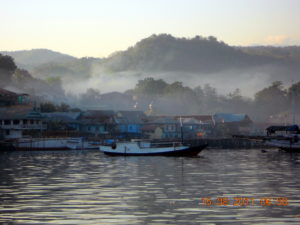
Flores is a classic Indonesian island with six or seven or ten different languages, depending on who’s counting. But, thanks to the Portuguese, almost everybody is Roman Catholic . . . except a few upland pagans the missionaries overlooked and, as far as we could tell, a single mosque in Labuan Bajo. The one up the hill from where we stayed.
It was a family-friendly sort of mosque and, like mosques everywhere in Muslimdom, came outfitted with huge loudspeakers to make sure that all God’s creatures within a parsec of the place knew when time had come for prayer. Also, it was children’s night. Which meant that, every couple of minutes a six. Or a seven. Or an eight-year-old . . . up weeks past his bedtime and frantic from a late-night sugar high . . . shrilled what may have been verses from the Qur’an into the blameless tropical air. Every minute or two. All night. You wouldn’t think there could be that many kids in a fishing village, but there they were.
The next morning, we took a boat to Rinca, a small island in the Komodo National park where, the year before, a pack of dragons had trapped a group of SCUBA divers on the beach for two days. Dragons hunting in packs. Now that was a notion to conjure with.
On Komodo Island, an elderly Swiss aristocrat with the delightfully snooty name of Baron Rudolf Reding von Bibiregg fell and hurt his knee. When his guide returned with help, all that was left was the baron’s hat, his camera and a bloody shoe.
Even in citified Los Angeles, a dragon managed to mangle the foot of Sharon Stone’s ex-husband, but that was a special case. The zookeeper had sent him into the cage barefoot. Why a zookeeper would suggest such a thing, and why La Stone’s ex would have done it, and whether she was involved with setting it up, has not been revealed to me.
We docked on Rinca at the same time as the dozen-or-so other visitors that day. The rangers looked us over, and the one with the most seniority chose Peg and me as the most senior-looking tourists. He told us later that he’d been up Ramadaning for weeks, was hungry, thirsty, tired, and hoping for people who wouldn’t want to make him hike around the island. Hearing that made me wonder which month in the ecclesiastical year von Bibiregg’s guide had chosen him. And whether Rinca might be the sort of place rangers get exiled to when something goes wrong on Komodo Island. And what, exactly, our guy’s work history had been. Whatever. We turned out to be the only tourists that day who did want to hike around the island. The others just hung out at park headquarters snapping pictures of dragons.

Or beneath the headquarters, depending on the predilection of the individual dragons.
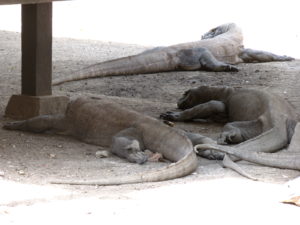
There were, as far as we could tell, no dragons inside the building, although that had been known to happen. The man who took our entrance fee had come to work one morning to discover a dragon under his desk. He required a few months in a hospital in Bali, along with massive doses of antibiotics to deal with the bacteria that infested the dragon’s teeth, but was back on duty by the time we showed up. Dragons, it turns out, don’t just hunt in packs.
In person, they’re a bit of a disappointment, at least for somebody raised on picture books as a kid. But that was just a matter of mismanaging expectations. As lizards, they’re gargantuan. You’d call animal control if you discovered a lizard the size of a full-grown, male African lion running up your wall. Especially if it had a full-grown, male European aristocrat in its jaws.
As a place to hike, Rinca is hot and dry, and organized around a modest-sized mountain . . . which we summitted by way of a rocky draw populated with thorn bushes and stunted-looking trees.
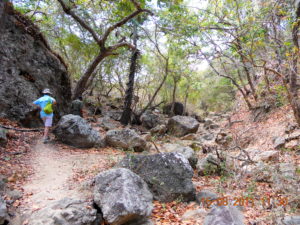
Every now and then we’d come to an open patch where our ranger would sit and catch his breath, and Peg and would turn our backs to gulp water from plastic bottles. August is mating season and the dragons, sensitive souls that they are, were seeking their own privacy beneath bushes and under trees. This had the reverse effect upon our modesty. When time came to relieve our bladders, we wouldn’t go anywhere near a bush. Or behind a tree. The ranger never needed to relieve his bladder.
The top of the little mountain was open and windswept-looking, and the trees and thorn bushes were replaced by cycads left over from dinosaur times.
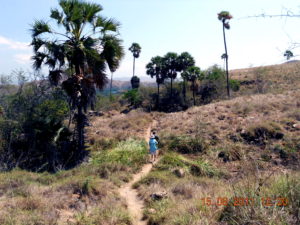
Or the scene with the collapsed triceratops from the original Jurassic Park movie, now that I think about it.
The government of Indonesia certainly has. Recently, they announced plans to transmogrify Komodo National Park into their very own Jurassic Park. Which, I’m pretty sure, is going to exacerbate the issues around managing expectations. Especially since they intend to charge a thousand dollars a pop, US, to get into the place. Which is a good deal more than the million-or-so rupiahs Peg and I paid to come by boat from Rinca. And none of which, I’m pretty sure, will wind up in the pockets of anybody in Labuan Bajo.
When we returned to the ranger station, the other tourists, and most of the rangers, had long since departed. On the way back to Labuan Bajo, the boat paused for an hour or so in the Flores Sea to let us watch the sun set over Kalong Island. And the flying foxes rise into the twilight. “Flying foxes” is the cuddly, tourist-friendly term for “huge, scary-looking bats,” and there were thousands of them. Tens of thousands. Hundreds of thousands, maybe,
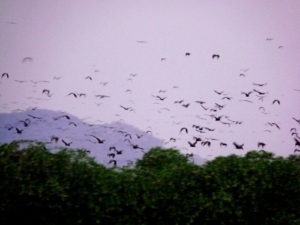
emerging from the mangroves in a dark column that swirled across the evening sky to settle in fruit trees on Flores. To Americans, they were evocative of buffalo on the planes of Nineteenth-century Nebraska, or passenger pigeons in the skies over New England. But maybe not so much to Floresians trying to make a living from orchards which, every night, are invaded by clouds of fruit-eating bats – big, hungry, fruit-eating bats.
Back in Labuan Bajo, children’s night had been so successful the mosque did it all over again. In the murdering sleep department, Lady Macbeth had nothing on those kids.


No Comments